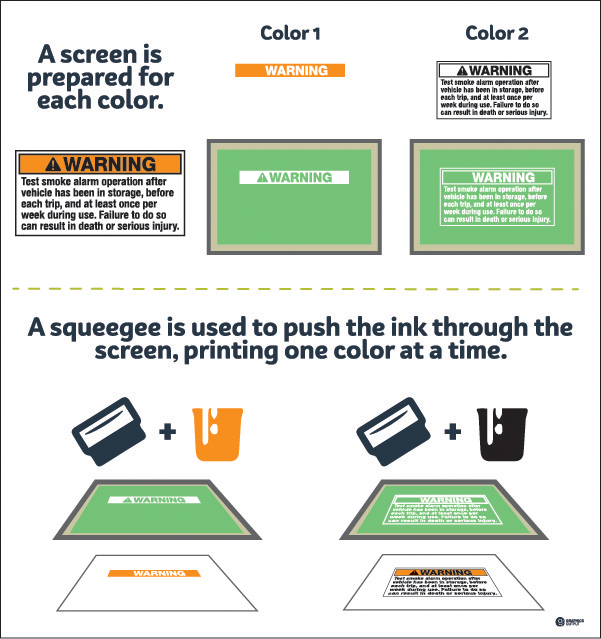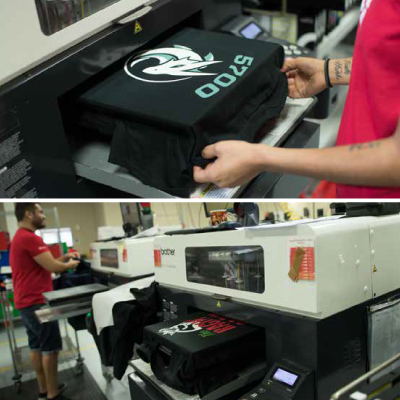The Single Strategy To Use For Tx Tees
The Single Strategy To Use For Tx Tees
Blog Article
Not known Incorrect Statements About Tx Tees
Table of ContentsMore About Tx TeesIndicators on Tx Tees You Should KnowThe Main Principles Of Tx Tees Not known Facts About Tx TeesTx Tees Can Be Fun For AnyoneThe Main Principles Of Tx Tees Some Known Incorrect Statements About Tx Tees
Include up other costs, like the number of energies it takes to run the shop and the price of ink and emulsion per layout. Take the print below.The solution should only be a couple of cents since you 'd only need to layer one display for this job. Exactly how much should you bill per shirt to make a revenue? Normally, printers attempt to make up to 45% profit on a print job. Right here's a table to aid you determine that: overall price per thing percent of desired profit as a decimal (example:.25 or.45) revenue made per product per task Now let's discuss the productivity of DTF.

With DTF, you can publish a handful of t-shirts, or just one. Both display printing and DTF have their specific niches in the world.
8 Simple Techniques For Tx Tees
The very best means to know? Ask around and see what print stores like your own are doing. embroidery shop. Attempt both out and see which you like better
When you're selecting what kind of printing approach to make use of for publishing your artwork designs on your garments, it is necessary that you recognize the differences between these two methods so you can maximize results while reducing expenses. Display printing is one of the most generally used method for printing styles on textiles.
DTG printing is likewise called area or straight to garment printing because it prints only what is needed rather than making a screen as display printers do. https://www.domestika.org/en/russellcostello79602. Screen printing functions by display filler squeegee screen printing ink display mesh screen, then moving the image to garment using warm and/or pressure
The DTG printer makes use of special dye-sublimation inks that are used into a pre-designed picture by a digital printing system. The inks come to be part of the textile, enabling for vivid colors and remarkable information. It's additionally called area or straight to garment printing since it publishes only what is needed rather than making a screen as display printers do.
See This Report about Tx Tees
Initially, it's much quicker - you can publish a fullcolor image in minutes, in contrast to hours for display printing. Second, there's no set up time or costs included - you can publish any kind of layout you such as, without having to create a screen. Third, there's no waste - because screen printers screen print one design at a time, they have to evaluate each shade individually.
The paper is really pricey and can just be made use of as soon as. Once it's published on, it needs to be thrown out. - The first acquisition cost is lower than the in advance investment of DTG printers- You can print multi-color designs one display at once rather than having to print each color independently like DTG printing.

9 Simple Techniques For Tx Tees
Nevertheless, as opposed to utilizing display mesh as screen printers do, dye sublimation printers make use of laser technology to transfer your pictures onto garments or paper. A heat process moves the color from its solid-state directly into the gas stage which subsequently fuses it onto material substratums when they are swiftly heated to heats under high stress.
Sublimation printing is environmentally friendly. It utilizes much less water than screenprinting, and because it doesn't include making use of hazardous solvents, it's risk-free for all kinds of garments. The dye sublimation inks are also odor-free when healed, unlike display printers that make use of harmful chemicals during the screen printing process that leave behind an unpleasant odor.
They likewise save money on expensive devices like direct exposure systems considering that color sublimation printers do not need a UV direct exposure device or a flash remedy stove that is commonly made use of in display printing (custom screen printing). What is straight to garment printing (DTG Printing)? DTG printing is an electronic screenprinting procedure that prints directly onto fabric using specialized inkjet printers
The Ultimate Guide To Tx Tees
DTG printing uses numerous benefits over typical screenprinting, consisting of the ability to publish photographic quality photos, higher color vibrancy, and the capability to print designs on darker textiles. DTG printers work by heating up the textile ink till it turns right into a gas. The gas after that permeates the textile, bonding with the fibers to produce an irreversible print.

Screen printers just prepare their screen then start printing until they lack item or ink.- There is a vast array of seasoned display printers throughout the globe, which can be practical for newbies. - It's a slower procedure - display printers commonly have to wait on the ink to dry before they can publish the following shade- Display printers need hands-on labor, so there's a greater discovering contour and it takes longer to create a high-grade layout- Screen printing isn't as accurate as DTG printing, so you may obtain some "blood loss" of colors from one component of the photo onto one more if not done properly.
The Ultimate Guide To Tx Tees
Instead of utilizing screen mesh as screen printers do, color sublimation printers utilize laser modern technology to transfer your photos onto garments or paper. A heat procedure transfers the dye from its solid-state straight into the gas stage which consequently integrates it onto material substratums when they are rapidly warmed to heats under high stress.
Sublimation printing is green. It utilizes much less water than screenprinting, and since it does not involve the usage of damaging solvents, it's secure for all types of clothing. The color sublimation inks are also odor free when healed, unlike display printers that use dangerous chemicals throughout the display printing procedure that leave an unpleasant odor.
They likewise conserve cash on costly devices like direct exposure devices since dye sublimation printers don't call for he said a UV exposure device or a flash remedy stove that is commonly used in screen printing. What is direct to garment printing (DTG Printing)? DTG printing is an electronic screenprinting procedure that publishes straight onto textile using specialized inkjet printers.
See This Report about Tx Tees
DTG printing provides numerous benefits over traditional screenprinting, including the capacity to publish photo high quality images, higher color vibrancy, and the ability to publish layouts on darker materials. DTG printers work by heating the fabric ink till it transforms into a gas. The gas then permeates the textile, bonding with the fibers to develop a long-term print.
Report this page